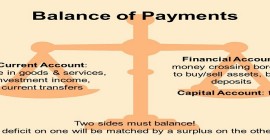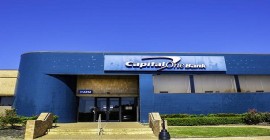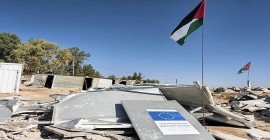Industrial Zone in Hebron: An Area that Doesn’t Live Up to its Name
Despite the fact that the Industrial Zone in Hebron contributes with around 12% of the GDP, it violates all laws and regulations, and suffers from great neglect.
Ansar Tomaizi – Palestine Economy Portal
Translated by: Tamara Barakat
Usually, governments all over the world give special and great attention to their industrial zones, considering the services that the factories and companies in these zones require in order to be able to produce goods with competitive prices, and considering the importance of these zones in increasing the country’s tax revenues and providing employment opportunities for the people.
The Industrial Zone in Hebron, however, violates all laws and regulations and suffers from great neglect, despite the fact that its production contributes with around 12% of the GDP. Although there are 170 industrial facilities in the Zone, the area suffers from lack of basic services like water, and a deteriorated infrastructure. Moreover, it heavily pollutes the environment.
Upon conducting a tour in the area, the Palestine Economy Portal reporter said that it resembles slums, with 170 industrial facilities too close to each other and located among the homes of the citizens. The Zone’s roads are also unpaved.
Lack of Security Control and Infrastructure
Jawad Al-Sayyed, the Chairman of the Chamber of Commerce in Hebron, called the area an “Industrial Zone,” but mentioned that it is quite hard to classify it as so when it lacks services and infrastructure. He also said that the fact that this Zone is classified within Area H2, which is under the control of the Israeli Authority, has prevented the Palestinian Authority from developing the services provided in it.
Internal Problems
Amjad Ebeido, the Head of the Engineering Department in the Hebron Municipality, said that store and factory owners do not abide by the regulations and public hygiene. They dispose of their industrial waste by throwing it in the middle of the streets and on sidewalks, ruining the appeal of the area.
The Hebron Municipality rehabilitated and paved the whole area eight years ago. However, due to being an industrial area that uses heavy machinery and equipment, the roads were destroyed again.
He added that the Hebron Municipality received funding from the USAID to rehabilitate all the roads in the Industrial Zone, as well as the water and sewage networks. The political situation has delayed the approval of the grant, which in itself delayed the implementation of the project.
Due to this delay, the Municipality has done an emergency rehabilitation by repaving parts of the area, until the main phase of the said project starts and repaves and rehabilitates the entire roads.
The costs of rehabilitation incurred by the Hebron Municipality fund exceeded over 300 thousand NIS.
An Inactive Treatment Facility
Moreover, sewage networks are not prepared to receive the disposal of factories, especially that of stone manufacturers. Even the treatment facility for wastewater resulting from stone quarries is not properly utilized, and there is a need to organize the relationship between the Municipality who established the treatment facility and the factories in the area.
Regarding the treatment facility, Marwan Al-Akhdar, the Head of the Water and Sanitation Unit in the Hebron Municipality, said that its operational cost exceeds over 600 thousand NIS each year, and it constantly requires installing spare parts, not to mention that the road leading to it is unsuitable.
He also added that they are currently searching for an alternative location for this facility, and considering the possibility of transferring quarry wastewater to evacuated quarries.
Operation Costs Increase by Double
According to the Chairman of the Chamber of Commerce in Hebron, the lack of services and infrastructure leads to increasing the operational costs on the factory owners in the Industrial Zone. Shortage in water forces them to buy it for higher prices; unpaved roads increase the damage to the cars and vehicles; and the sewage network problems are exacerbating by each passing day. He also said that the Industrial Zone’s competitiveness is decreasing due to its difficult conditions.
A “de facto” Industrial Zone
Maher Hushaysh, the CEO of Union of Stone and Marble Industry, described the Industrial Zone in Hebron as a “de facto” zone. It does not have any of the characteristics required to qualify it as an industrial zone. The most important factor needed for production – water – is unavailable, and factory owners are forced to buy it for high costs. Also, the tariff for industrial consumers of electricity is not very encouraging, and does not lend any support to factory owners. Not to mention the lack of extra space that would allow the factories to expand as needed.
Abed Al-Raouf Sheikh, the General Manager of the Hebron Electric Power Co., responded by saying that this tariff, approved by the Palestinian Cabinet on September 15, 2015, is less than the tariff for residential and commercial consumers, and it amounts to 56 agoras and a 1.16% deducted from the taxes on daily basis.
Water: a Permanent Problem
Naji Al-Qasrawi, from the Hebron Municipality’s Water Department, explained that the reason for the shortage in water in Hebron is the small amount of water supplied to the area by the Palestinian Water Authority. The supplied amount does not even cover the minimum daily requirements of water for the citizens.
He further added that the Israeli occupation prohibits digging wells in the southern areas of the West Bank, especially the in the west basin. Also, it does not permit the establishment of facilities for saving water or for the collection of rainwater.
Israeli Occupation Policies
Moreover, Hushaysh told the Palestine Economy Portal that the Israeli occupation’s closure policies to the southern entrances of the Industrial Zone prevent it from being connected to the quarries located in the east of Hebron, disrupt its workflow, and heavily increase its operational costs, especially during the current difficult conditions Palestinians are going through, which led to even more closures. He called on the Palestinian Government to activate the developmental policies for the industrial sector in cooperation with the Ministry of Economy, in order to support the industrial sector, which is an important pillar for the economy of any country.
Also, relevant and specialized parties in Hebron succeeded in obtaining a preliminary Israeli permit through the Civil Affairs that allows for using 1589 dunums in Area “C” for the purpose of constructing a new qualified industrial zone in Hebron.
However, until the Israeli occupation authorities fulfill their promises and the construction of this new industrial zone starts, the current southern Industrial Zone remains as it is, with continuously deteriorating infrastructure, environment, and services until further notice.






